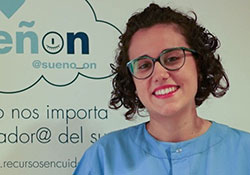A nurse researcher in Spain helps bring evidence into practice

Inés María Comino Sanz is a nurse and junior researcher at the Nursing and Healthcare Research Unit (Investén-isciii) of the Carlos III Health Institute in Madrid, Spain. The Institute is a public body under the jurisdiction of the Ministry of Economy, Industry and Competitiveness and promotes research in biomedicine and health care.
Inés speaks to WHO/Europe about the emphasis that the Institute places on the importance of sleep in recovery, and how nurses are providing better quality care by integrating research into their work.
“I obtained my nursing degree in 2015 from the University of Jaén in Spain, and work as a junior researcher at the Nursing and Healthcare Research Unit. Previously, I worked in a public regional hospital, in its post-surgical care unit. At the time, I saw first-hand the need patients have for multidisciplinary care including pain control and psychological support. Their rest is just as important. Research has shown that hospitalized patients who sleep less than 5 hours at night have a 4 times higher risk of mortality. This makes sleep an important part of nursing care.
“Our Institute initiated the SueñOn project to improve the sleep of hospitalized patients and to promote their rest. The project is nursing-led and proposes simple measures to avoid disruption in patients’ sleep on the basis of scientific evidence. These include avoiding unnecessary light and reducing ambient noise during the rest periods, organizing health care tasks to allow rest, as well as asking and taking into account patients’ preferences.
“There are about 3000 nurses all around Spain who volunteer to ensure that these measures are followed. Nurse leaders at various hospitals have the responsibility of guiding nurses’ groups through the measures, and I work directly with 50 nurse leaders to monitor the project.
“We have had very good feedback from patients, and have also asked their caregivers to get involved in the project and help create a peaceful environment, particularly during the ‘magic’ hours of midnight to 6:30 am.
“We have created a free-access bibliographic repository online with information on available evidence. This year, we will also develop other research projects associated with SueñOn to provide information to managers to help modify the environment in their hospitalization units.
“I am very fortunate to work with other nursing researchers here, and find it very fulfilling to see patients being able to do the same things that they did before surgery. It is a huge learning opportunity and also demonstrates to nurses and the larger society the difference that nursing research makes to people’s health.”



